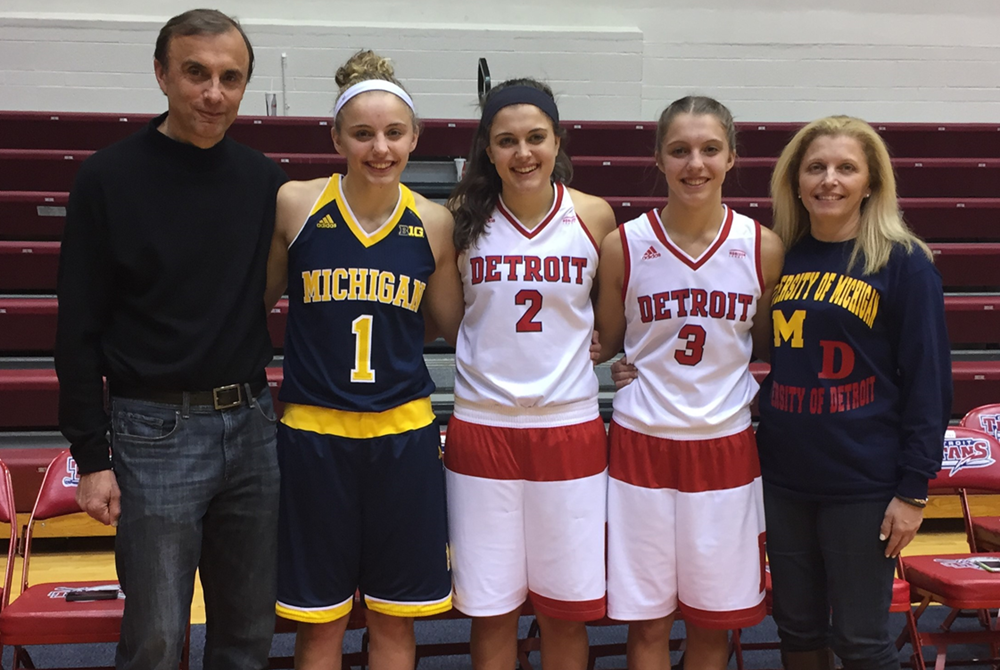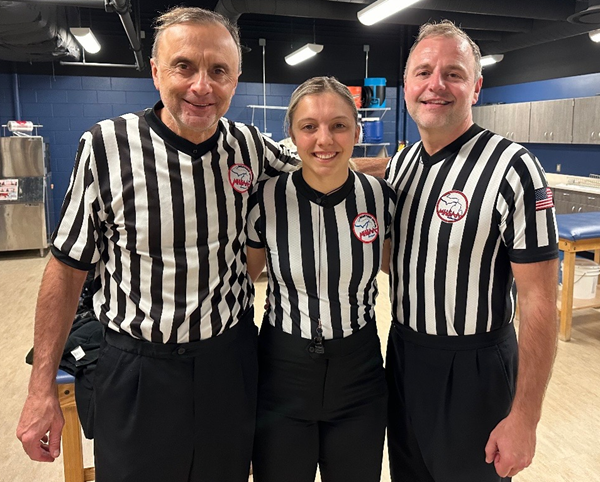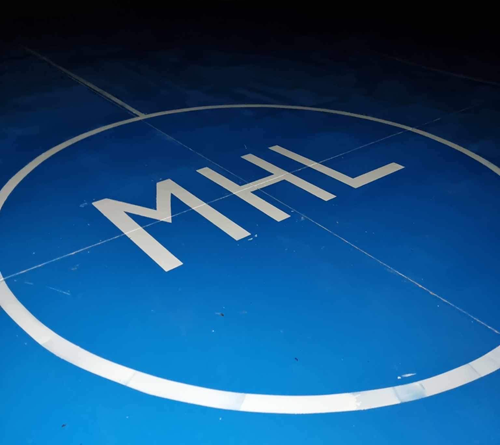
Concussion Testing Pilots Kick Off Fall
August 4, 2015
By Geoff Kimmerly
Second Half editor
The Michigan High School Athletic Association kicked off the 2015-16 school year Monday by hosting 70 member high schools for training in two pilot sideline concussion testing programs aimed at assisting in decision-making regarding the removal of athletes from activity after possible concussion events and record-keeping of those events beginning this fall.
Illinois-based King-Devick Test and Maryland-based XLNTbrain Sport each will be used to monitor approximately 10,000 Michigan high school student-athletes drawn from schools representing all four classes and a variety of regions statewide.
The pilot programs are part of a three-pronged advance by the MHSAA in concussion care this fall. In addition to becoming the first state association to offer pilot sideline concussion testing, the MHSAA will be the first to mandate record-keeping by member schools of all possible concussion events from detection to an athlete’s return to play. The requirement applies to both practices and events, all levels of all sports in grades 7 through 12.
The MHSAA also this fall is the first state association to provide all participants at every MHSAA member high school and junior high/middle school with insurance intended to pay accident medical expense benefits – covering deductibles and co-pays left unpaid by other policies – resulting from concussions sustained during MHSAA practices or competitions. There is no cost to either schools or families.
“These pilot programs are intended to not only improve what’s actually happening on the sidelines at practices and contests in these communities that are part of the pilot programs, they’re intended to spread the word of the need for improved concussion detection across every community,” MHSAA Executive Director John E. “Jack” Roberts said. “We hope these schools involved will become involved in their leagues and conferences and with their peers across the state as we expand the awareness of the need for better sideline detection and provide ways to get it done.”
The MHSAA asked schools at the end of this spring to volunteer for the pilot programs and then selected participants in order to guarantee a variety of schools based on enrollment and location. Schools are committed to involving at least two sports for each gender each season.
Schools participating in the XLNTbrain Sport pilot program are: Adrian, Adrian Madison, AuGres-Sims, Bay City Central, Bear Lake, Brethren, Belding, Birmingham Groves, Brighton, Chesaning, Corunna, Detroit Collegiate Prep, East Kentwood, Fennville, Fowlerville, Gibraltar Carlson, Grand Rapids Christian, Grandville, Greenville, Grosse Ile, Hamilton, Harrison Township L’Anse Creuse, Hazel Park, Kalamazoo Christian, Lansing Christian, Macomb L’Anse Creuse North, Owosso, Pewamo-Westphalia, Portland, Reese, Rochester Hills Lutheran Northwest, St. Clair Shores Lakeview, St. Johns, Stanton Central Montcalm, Vermontville Maple Valley, West Bloomfield and Wyoming Kelloggsville.
Schools participating in the King-Devick Test pilot are: Bay City Western, Benton Harbor, Buchanan, Calumet, Caro, Caseville, Detroit Cody, Detroit Martin Luther King, Fenton, Flint Kearsley, Frankenmuth, Fruitport, Garden City, Grand Ledge, Grand Rapids Northview, Lake Leelanau St. Mary, Lake Linden-Hubbell, Lincoln Alcona, Midland Bullock Creek, Montague, Muskegon, Niles, Pontiac Notre Dame Prep, Romeo, Saginaw Heritage, Scottville Mason County Central, Shelby, St. Charles, St. Joseph, Tawas, Vicksburg, Whitehall and Yale.
The King-Devick Test is a rapid eye movement screening evaluation that requires athletes to read single-digit numbers displayed on a tablet computer in order to detect impairments of eye movement, attention, language, concentration and other symptoms of abnormal brain function. The test has been validated in more than 50 recent peer reviewed articles published in elite medical journals and is associated with the Mayo Clinic.
The test is administered on the sidelines during evaluations for suspected head injuries, and the post-injury results are then compared to an athlete’s preseason baseline. Any worsening of performance (increased time and/or errors) suggests a concussion has occurred and the athlete should be “removed from play” for further evaluation.
“The first and most critical step in managing concussion in the youth athlete is to recognize when one has occurred – not always a simple task,” said Dr. David Dodick, professor of neurology and director of sports concussion services at the Mayo Clinic. “The King-Devick test helps take the guesswork and subjectivity out of the sideline evaluation in a rapid, accurate, and objective way.”
 XLNTbrain Sport includes balance and web-based neuro-cognitive tests also used before the start of a season to create a baseline measurement of reaction time, attention, inhibition, impulsivity, memory, information processing efficiency and executive function. The test also assesses mood, anxiety, stress and emotionality.
XLNTbrain Sport includes balance and web-based neuro-cognitive tests also used before the start of a season to create a baseline measurement of reaction time, attention, inhibition, impulsivity, memory, information processing efficiency and executive function. The test also assesses mood, anxiety, stress and emotionality.
After a possible head injury, a sideline assessment is done using a smartphone or tablet with those results then compared with the athlete’s baseline measurements. The program documents the severity of a concussion, provides a guide for on-the-field decision making regarding treatment and recovery time and can report results via email to parents, coaches, training staff and medical professionals.
Dr. Harry Kerasidis, who designed the XLNTbrain Sport software, presented at the Coalition for Concussion Treatment Summit at the United Nations building in 2014.
“We included an objective balance test that relies on smartphone accelerometer technology which is effective in the field during practice and game situations,” Kerasidis said. “Should a concussion injury be suspected, the system automatically generates a notification to parents and medical professionals and creates a recovery protocol and post-injury tracking so the right people can monitor the athlete’s progress. Then, the system assists medical professionals with the all-important return-to-learn and return-to-play clearance.”
Click for information on XLNTbrain Sport. Click for information on the King-Devick Test.
For more on Health & Safety, including preseason physical examination, hydration and cardiovascular resources in addition to concussion information and online training sessions, visit the MHSAA’s redesigned Health & Safety web page.
PHOTOS: (Top) Saginaw Heritage athletic director Peter Ryan (right) is administered the King-Devick baseline test by K-D's Samantha Figueroa. (Middle) XLNTbrain Sport creater Dr. Harry Kerasidis provides insight on his program to those being trained to use it Monday.

Longtime Taylor AD, Game Official Ristovski Chose Athletics as Way to Give Back
By
Doug Donnelly
Special for MHSAA.com
February 20, 2024
There is a basketball court 5,000 miles from Sterling Heights with “MHL” painted on the center court.
 It’s not the name of a local basketball league in the village where it is located – Siricino, Macedonia. Instead, it stands for Madison, Haleigh and Lola, the three daughters of longtime Michigan basketball coach, referee and athletic director Loren Ristovski.
It’s not the name of a local basketball league in the village where it is located – Siricino, Macedonia. Instead, it stands for Madison, Haleigh and Lola, the three daughters of longtime Michigan basketball coach, referee and athletic director Loren Ristovski.
“My dad loved going back (to Macedonia),” said Madison Ristovski. “He’s probably gone every summer since about 2017. His whole family still lives there. He loved going and visiting and seeing everyone.
“It was always a goal of his to give back to where he came from. He and Mom donated to the village to build a soccer field and basketball court with lights and everything. It was a pretty big deal. It’s something he wanted to do for them back home. We were very proud he did that.”
Loren Ristovski, athletic director for Taylor schools, died earlier this month while on leave to have surgery on his foot. It was a shock to his family, friends, and the Taylor community.
“It was a heavy blow,” said Matt Joseph, girls basketball coach at Utica Ford and a longtime friend of the Ristovski family. “It was like getting kicked in the gut. Basketball was his passion. Next to his family, basketball was definitely No. 1. He loved the game and all the intricacies of it. He loved seeing kids excel.”
 Ristovski emigrated from Macedonia to Michigan when he was 9. He went to high school at Hamtramck St. Florian, where he excelled at basketball. He went to Wayne State University to get a degree in criminal justice and had plans to become a lawyer.
Ristovski emigrated from Macedonia to Michigan when he was 9. He went to high school at Hamtramck St. Florian, where he excelled at basketball. He went to Wayne State University to get a degree in criminal justice and had plans to become a lawyer.
Before he could take the Law School Admission Test, however, basketball came calling.
“He started coaching at Henry Ford High School and Fuhrmann Middle School,” Madison said. “Once he realized how much he enjoyed coaching, he decided to go into education. He stayed the entire time. He never went to law school.”
Loren Ristovski became the head coach at Harper Woods but gave that up when his daughters were ready to start playing in high school.
“He gave up coaching varsity at Harper Woods so he could be at every one of my games,” Madison said.
He also coached them as youngsters, often teaming with Joseph to coach an AAU team.
“I met him when Madison was 5,” Joseph said. “He and I decided to put our daughters in the same parks and recreation team, and next thing you know we were coaching AAU.”
With Ristovski’s tutoring, Madison, Haleigh, and Lola all excelled at the game, each playing Division I college basketball after standout careers at Grosse Pointe Woods University Liggett. In 2012, Liggett reached the Class C Final with all three starting. They combined for 55 of Liggett’s 57 points in the championship game, with Madison scoring 42 after earlier that week receiving the Miss Basketball Award.
Lola and Haleigh played at the University of Detroit Mercy, and Madison played at the University of Michigan. Today, Haleigh lives on the west side of the state and plays recreational basketball. Lola is a referee in the Catholic High School League as well as for the Division II Great Lakes Intercollegiate Athletic Conference, and also works area Division III college games.
Madison is a teacher and the varsity girls basketball coach at Sterling Heights Stevenson.
“He taught us the game when we were very, very young,” Madison said. “We grew up in the gym with him and watched him coach his team. He coached me my whole life. He was very instrumental – he taught us all those things you need to become an athlete, and more importantly the things you need to do to succeed in life.”
Her dad is the reason she became a coach.
 “Watching my dad coach and seeing the impact he had on his high school athletes and even the kids in our church community – it inspired me to want to coach as well and give back like he did,” she said. “I watched him with my teammates and the impact he had on them. I thought it would be so cool if I could do the same for others.”
“Watching my dad coach and seeing the impact he had on his high school athletes and even the kids in our church community – it inspired me to want to coach as well and give back like he did,” she said. “I watched him with my teammates and the impact he had on them. I thought it would be so cool if I could do the same for others.”
Loren Ristovski left a legacy at Taylor, too. School officials recounted several stories of how he balanced athletic budgets with the needs of student-athletes. He would lead fundraising efforts, created the Bitty Ball program for youth basketball players and cheerleaders and helped students become certified officials – and then would hire them to officiate games.
“He didn’t say no,” said Taylor boys basketball coach Chris Simons. “We made it work. We didn’t go out and ask people for a bunch of money. We would just do it. We all pulled together and made it work. Loren did everything he could to make things as pretty and presentable as he could with the budget we had.”
Ristovski also put on summer camps at both Taylor and at the Joe Dumars Fieldhouse in Sterling Heights, where he lived. He commuted about an hour to Taylor every day.
“He loved Taylor,” Madison said. “He loved who he worked with and the students. He included us, too. My mom would run the ticket table or do the scoreboard clock. I don’t know how many times I sold tickets for volleyball tournaments with him. He loved his people and loved having us there with him.”
Loren Ristovski, who played professional basketball in Europe during the late 1980s, ran well over 20 marathons in his life, including the Boston Marathon. He was a registered MHSAA official for 16 years, and in the weeks before his passing he refereed a varsity game in Rochester with his daughter, Lola.
“He looked at basketball, I think, differently than other people do,” Madison said. “He saw it as a way to have relationships with other people, to help people achieve their goals and to find meaningful relationships with others. It was more than just a game to him.”
 Doug Donnelly has served as a sports and news reporter and city editor over 25 years, writing for the Daily Chief-Union in Upper Sandusky, Ohio from 1992-1995, the Monroe Evening News from 1995-2012 and the Adrian Daily Telegram since 2013. He's also written a book on high school basketball in Monroe County and compiles record books for various schools in southeast Michigan. E-mail him at [email protected] with story ideas for Jackson, Washtenaw, Hillsdale, Lenawee and Monroe counties.
Doug Donnelly has served as a sports and news reporter and city editor over 25 years, writing for the Daily Chief-Union in Upper Sandusky, Ohio from 1992-1995, the Monroe Evening News from 1995-2012 and the Adrian Daily Telegram since 2013. He's also written a book on high school basketball in Monroe County and compiles record books for various schools in southeast Michigan. E-mail him at [email protected] with story ideas for Jackson, Washtenaw, Hillsdale, Lenawee and Monroe counties.
PHOTOS (Top) Loren Ristovski, far left, and wife Svetlana support their lineup of Division I basketball-playing daughters – from left: Madison, Haleigh and Lola. (Middle) Loren Ristovski heads an all-family officiating crew with Lola and his brother Dean Ristovski. (Below) The daughters’ initials “MHL” glow on the court the family funded in Macedonia. (Photos courtesy of Madison Ristovski.)

